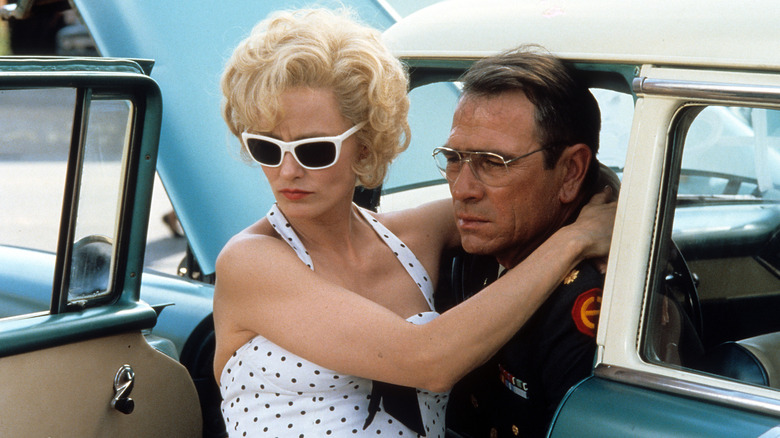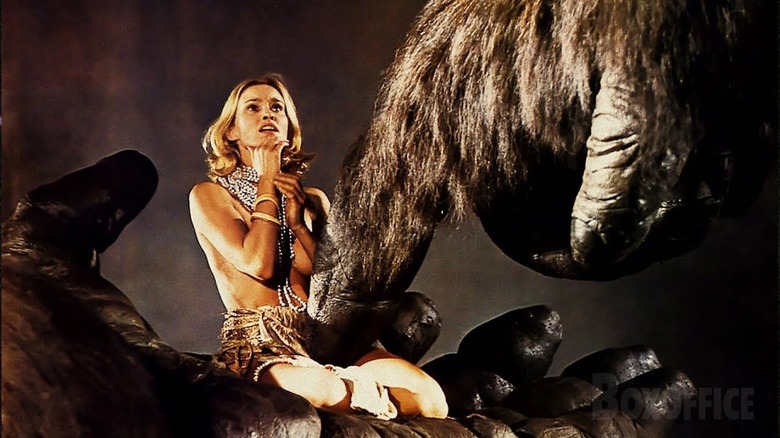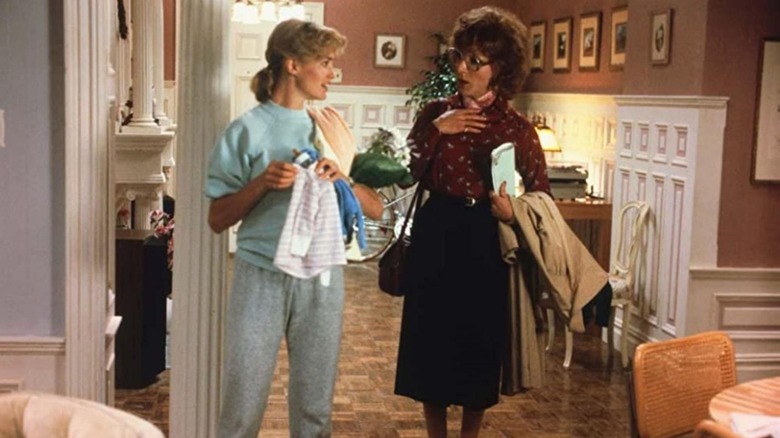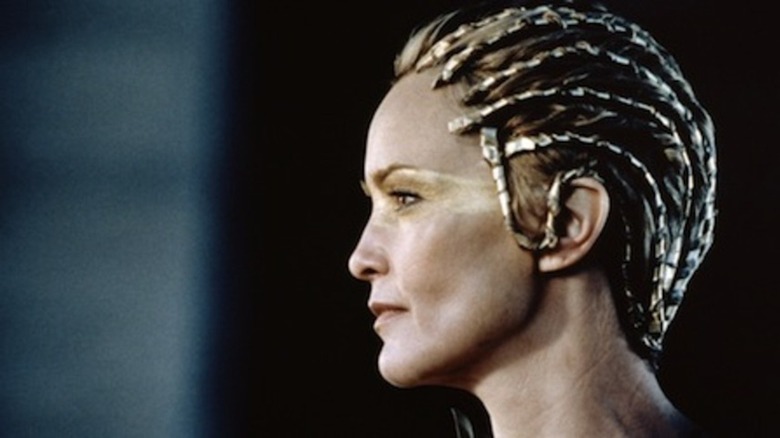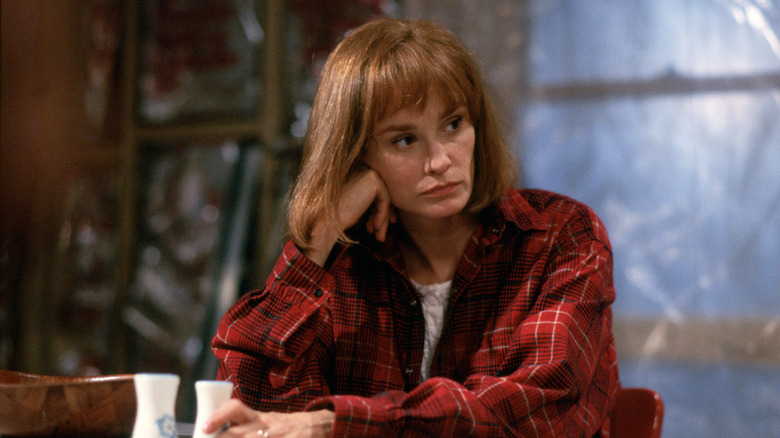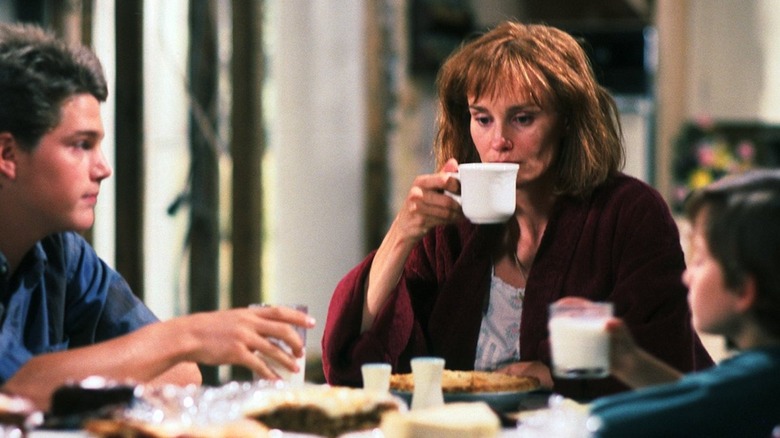Jessica Lange Is The Best Actor Ever
Jessica Lange came by her restlessness naturally. Born on April 20, 1949, to a stay-at-home mom and a traveling salesman father who moved the family all over the state of Minnesota, she quickly became acclimated to the process of re-acclimating. Eventually, the need for stabilization lost its appeal. Three years into studying art and photography at the University of Minnesota, she married Spanish photographer Paco Grande, at which point their shared wanderlust took them all over the United States and Mexico. The pair split upon moving to Paris, where Lange discovered Étienne Decroux and corporeal mime — which departs from the conventional white-faced japery you're familiar with, and seeks to find abstract poetry in the movement of people and things.
Lange possessed the soul of a poet, but found this form of performance emotionally unrewarding, so she decamped for New York City to study acting with Mira Rostova at HB Studio. She also put her fine-boned Midwestern beauty to work by signing on with the Wilhelmina Modeling Agency. But after years of dabbling, Lange was zeroing in on acting. Now in her mid-20s, you'd think she might've felt a sense of urgency; her ingénue years were slipping away. But Lange's plan was to take her time, study, and, when she was ready, hit the off-Broadway audition circuit.
Alas, the world had no interest in waiting on Lange. Perhaps it should've. Hollywood stardom came all at once, then was swiftly snuffed out. Critics wrote her off as a pretty face who belonged in perfume ads, not movies. She went three years in between roles before Bob Fosse revived her career as the Angel of Death. She kicked off her 1980s with two Oscar nominations and one win. By the end of the decade, she was considered Meryl Streep's equal.
47 years since her near-fatal debut, Lange has lost none of her restlessness. When movies did their ageist thing, she deftly segued to television and picked up more laudatory hardware. At 74, she seems refreshingly fearless, maybe because she's already seen and escaped the abyss.
The breakout
Jessica Lange had never been to Hollywood when producer Dino De Laurentiis, impressed by her modeling, asked her to fly from NYC to screen test for the role of Dwan in John Guillermin's 1976 remake "King Kong." She showed up sporting a blonde afro, which displeased De Laurentiis and almost cost her the role before she'd read a line of dialogue. And while Lange told The New Yorker's Hilton Als she was clueless about playing to the camera at this nascent juncture in her career, she sufficiently charmed the producer and Guillermin and was offered the part in the room.
There was kismet at play here, though only critic Pauline Kael picked up on it at the time. Lange plays Dwan, a wannabe starlet who's been rescued at sea by a ship full of men on an oil-seeking expedition to a fog-enshrouded island, with dewy-eyed wonder, as if she's discovering the world anew every time she opens her eyes. Every single man on that ship (especially Jeff Bridges' strapping Jack and Charles Grodin's rapacious Fred) believes she only has eyes for them. She's entitled, but disarmingly so.
Basically, she's Carole Lombard's Irene Bullock from "My Man Godfrey."
Whether her name, Dwan, is a coincidence (Lombard was discovered by director Allan Dwan) doesn't matter. Once you're on Lange's wavelength, the film is a cheekily epic delight. She makes potentially clunky lines like "You goddamn chauvinist pig ape" sing. Most importantly, she sells the interspecies romance, which brings home the inevitable heartbreak of the finale.
Unfortunately, Lange was an unknown quantity to critics and moviegoers, so a misguided conventional wisdom set in that she wasn't acting, that she was, inexplicably, as naive as Dwan. When Lange, who was under contract to De Laurentiis, went without a part for several years, this assumption went unchallenged, and her model background was used as a cudgel against her. Then she finally got out of her contract, and the rest of her career happened.
The career
Lange ended her helter skelter 1970s as Angelique, the lovely, beckoning embrace of death awaiting Roy Scheider's creative genius in Bob Fosse's "All That Jazz." She didn't sound clueless this time out, and the movie was a critical/awards sensation to the tune of nine Oscar nominations. Maybe her naysayers had been hasty in declaring her a lightweight.
Lange laid waste to these nitwits in 1982 with her scalding portrayal of the brilliant, yet mentally troubled actor Frances Farmer in "Frances." Lange overcame a rote screenplay and flat direction to earn her first Academy Award nomination for Best Actress, but her best work that year — and very close to the best of her career — arrived in "Tootsie," where she plays Julie Nichols, a soap opera star and single mother trapped in an emotionally abusive relationship with her show's tyrannical director. Juile's empowered by her new costar, Dorothy Michaels/Michael Dorsey (Dustin Hoffman), and wonders why she can't be as brazen and successful as she is (not knowing that Dorothy is a male fabrication unburdened by the, well, everything of being a woman). As she numbs her misery nightly with chardonnay, Lange lets us see past that precipice from which Julie is dangling. Michael sees it, too, and this partially shames him into ending his charade.
Lange won Best Supporting Actress for "Tootsie," which led to a string of showy roles that were too often better than the movies deserved. 1984's "Country" is a sturdy drama about the plight of U.S. farmers in the 1980s that placed her opposite longtime significant other Sam Shepard, but it lacks oomph. The same is painfully true of "Sweet Dreams," Karel Reisz's inert Patsy Cline biopic that blows Lange's fabulous performance as the country music icon. She was relegated to the unhappy athlete's wife role in "Everybody's All America," but bounced back nicely as the conflicted daughter of an accused Nazi war criminal in Costa Gavras' compelling "Music Box."
The career part 2
Lange entered the 1990s as one of the most acclaimed actors of her generation, but the movies continued to be a mixed bag. After a couple of solid supporting performances in "Cape Fear" and "Night and the City," she made a meal out of "Blue Sky." Lange's Carly Marshall is a firecracker of a military wife who enlivens what could easily be a doleful, itinerant life by play-acting as a movie star like Marilyn Monroe or Brigitte Bardot. When the family is transferred to a dumpy Alabama Army base, Carly's act grates on her fellow wives while drawing the affections of a married general (Powers Boothe). Lange's the movie, and, amazingly, that's enough. The Academy agreed, as she won her first Best Actress Oscar for her all-the-trimmings portrayal.
Good as Lange is in "Blue Sky," her take on Tamora, the Queen of the Goths, in Julie Taymor's "Titus," an outlandish rendition of Shakespeare's "Titus Andronicus," is a grandstanding hoot. Once again, even when doing The Bard, Lange has the misfortune of being saddled with weak material (this tragedy is easily Shakespeare's worst), but Taymor emboldens her cast (including Anthony Hopkins and Alan Cumming) to play every scene to the limb-rending hilt. Everyone shines, but Lange is gloriously unrestrained as a vengeful matriarch hellbent on bloody satisfaction.
Lange turned 50 in 1999, which can be terminal to any woman's Hollywood career. She's continued to make movies, but her best work by far has been on stage and television. She earned a long-desired Best Leading Actress Tony for the 2016 revival of Eugene O'Neill's "A Long Day's Journey into Night," and played a delightfully quirky duet with Drew Barrymore in HBO's dramatization of "Grey Gardens." Her collaborations with television super-producer Ryan Murphy – which began with "American Horror Story" and peaked with "Feud," where her Joan Crawford crossed swords with Susan Sarandon's Bette Davis on the set of "Who's Afraid of Virginia Woolf" — cried out for sharper writing.
It's strange to pick through such an amazing career and be so frequently disappointed by the material. Lange appears to agree to some extent. In interviews, she still calls "Tootsie" the best film she ever made. I agree, but it's not her best performance.
The defining performance
At the end of the 1980s, audiences wanted Meryl Streep to unwind and do a comedy. As for Lange, a film that wasn't a must-see based merely on her involvement was all we asked.
Warner Bros. dumped Paul Brickman's "Men Don't Leave" on February 2, 1990. A family drama about Beth, a grief-stricken widow (Lange) struggling to find purpose in her life while being a functional mother to her two unmoored sons (Chris O'Donnell and Charlie Korsmo), the film was the antithesis of Brickman's blockbuster debut, "Risky Business." No one drives a Porsche 928 into Lake Michigan, and the sexiest moments of the film find a young O'Donnell being seduced by an older Joan Cusack.
If WB had no faith in a Lange vehicle as an Oscar contender, then it must be a dog, right? Yes. It's a mutt. A busted-down runt of the litter that's shy about earning your affection. But let that pup in, and it'll burst your heart. That's "Men Don't Leave."
Everyone is amazing in this film, but it's Lange playing a housewife, who thought her working days were behind her, who turns it into an unassuming classic. When Beth is forced to uproot her boys from their under construction dream house to an unglamorous Baltimore apartment building, their once tight-knit unit rips apart. And it kills us because we know the boys were their father's sons. She was the taken-for-granted glue, and they can't bear to see her be anything but their lovingly dutiful caretaker.
The defining performance part 2
Beth begins a tentative relationship with a divorced avant-garde musician (Arliss Howard), and takes a gourmet grocery gig working for an abrasive boss (Kathy Bates), but these are awkward fits. She's settling, meekly so. It's not until Beth defiantly, drunkenly chucks dozens of freshly baked muffins out of her apartment window that the fight we expect from a Lange character surfaces, but this is defeat, too. And then she disappears into a barbiturate-induced cocoon.
Brickman is also out of his comfort zone here, to the extent that he had one based on the Reagan-era satire of "Risky Business." The narrative takes bizarre risks, and drifts away from Beth for extended periods of time. But everything that occurs within this film hinges on her salvation. And this will come not through acclimation but reinvention.
This film arrived at the perfect moment for Lange, and it crushes me that a film this gently offbeat couldn't get its day in court. Beth reminds me of Julie from "Tootsie," but she's trapped by built-in, nuclear family expectations, which is a less overt form of sexism. The simple act of dating and working unnerves her sons. It's not until Beth craters that they realize their mother is a complicated human being who didn't always dream of being their mother.
There's a restlessness lurking inside of Beth that's never been indulged. Allowing her to seek out her own happiness was Lange's gift to the character and the world.
